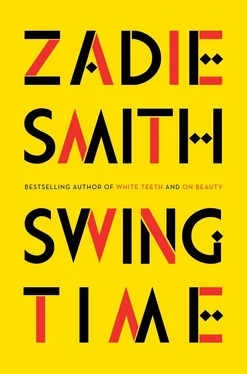“What you reading?”
I held up the book. She drew her legs back together — from where they had landed, back in the splits — and scowled at the cover.
“Never heard of it.”
“ Cabaret? It’s that, basically.”
“A book of the movie?”
“The book that came before the movie. I thought it might be useful, since we’re heading to Berlin. Judy sent me in here to crack the whip.”
Aimee made a face at herself in the mirror.
“Judy can kiss my bogan arse. She’s been giving me such a hard time recently. Think maybe she’s menopausal?”
“Think maybe you’re just annoying?”
“Ha ha.”
She lay down and lifted her right leg up in front of her, waiting. I went over and knelt before her, bending her knee into her chest. I was so much more heavily constructed — broader, taller, weightier — that whenever I stretched her like this I felt I had to be careful, that she was fragile and I could break her, though she had muscles I could not imagine having and I had seen her lift young male dancers almost as high as her head.
“The Norwegians were dull, weren’t they?” she muttered, and then an idea came to her, as if none of our conversations of the past three weeks had happened at all: “Why don’t we go out? Like, right now. Judy won’t know. We’ll go out the back way. Have a few cocktails? I’m in the mood. We don’t need a reason.”
I smiled at her. I thought about what it must be like to live in this world of shifting facts that move or disappear, depending on your mood.
“Something funny?”
“Nope. Let’s go.”
She took a shower and got dressed in her civilian outfit: black jeans, black vest and a black baseball cap pulled low, which made her ears stick out through her hair and gave her an unexpectedly goofy look. People don’t believe me when I say she liked to go out dancing, and it’s true we didn’t do it often, not in the later years, but it did happen and it never created much fuss, probably because we went late, and to gay places, and by the time the boys spotted her they were usually high and happy and full of an expansive sort of goodwill: they wanted to be protective of her. She’d been theirs years ago, before she was anybody’s, and looking after her now was a way of demonstrating that she still really belonged to them. Nobody asked for autographs, or made her pose for pictures, no one called the papers — we just danced. My only job was to demonstrate that I couldn’t keep up with her, and there was no need to fake this, I really couldn’t. At the point where my calves burned and I was as wet with sweat as if I’d stood under a hose, Aimee would still be dancing, and I would have to take my seat and wait for her. I was doing just that, in the roped-off area, when I felt a great thwack on my shoulder and something wet on my cheek. I looked up. Aimee stood over me, grinning and looking down, sweat dripping from her face on to mine.
“On your feet, soldier. We’re shipping out.”
It was one in the morning. Not so late, but I wanted to go home. Instead, as we approached the Village, she lowered the partition and told Errol to keep going right past the house, to head for Seventh and Grove, and when Errol tried to protest Aimee stuck out her tongue and raised the partition. We pulled up outside a tiny, scuzzy-looking piano bar. I could already hear a man with a grating Broadway vibrato singing a number from Chorus Line . Errol wound down the window and glared at the open doorway. He didn’t want to let her go. He looked at me pleadingly, in solidarity, as two people in the same boat — in Judy’s eyes we would both be held responsible tomorrow morning — but there was nothing I could do with Aimee once she’d set her will on something. She opened the door and pulled me out of the car. We were both drunk: Aimee overexcited, dangerously re-energized, me exhausted, maudlin. We sat in a dark corner — the whole place was dark corners — with two vodka martinis brought over by a barman of Aimee’s age so overwhelmed to be serving her it wasn’t clear how he was going to get through the practical matter of putting the drinks in front of us before he collapsed. I took the glasses out of his shaking hands and endured Aimee telling me the history of Stonewall, on and on, Stonewall this, Stonewall that, as if I’d never been to New York and didn’t know a thing about it. At the piano a group of white women at a bachelorette party sang something from The Lion King ; they had horrible, shrill voices, and kept forgetting the words. I knew it was childish but I was in an absolute rage about my birthday, my rage was the only thing keeping me awake, I was feeding off it in that righteous way you can if you never mention out loud the wrong you are being done. I sank my martini and listened without comment as Aimee moved on from Stonewall to her own early days as a jobbing dancer, in Alphabet City, in the late seventies, when all her friends were “these crazy black boys, queers, divas; all dead now,” stories I had heard so many times I could almost repeat them myself, and I was despairing of finding any way of stopping her talking when she announced she was “going to the dunny,” in an accent she used only when very drunk. I knew her experience of public toilets to be limited but before I could get to my feet she was twenty yards ahead of me. As I tried to pass through the drunken bachelorettes the piano player looked up at me hopefully and grabbed my wrist: “Hey, sister. You sing?” At the same moment Aimee skipped down the basement steps and disappeared from view.
“How about this right here?” He nodded at his sheet music and passed a weary hand over the ebony sheen of his bald head. “Can’t listen to these girls no more. You know it? From Gypsy? ”
His elegant fingers were to the keyboard, and I was singing the opening bars, the famous preamble, in which only the dead stay home, while people like Mama, oh, they’re different, they won’t just sit and take it, they’ve got the dreams and the guts, they won’t stay and rot, they’ll always fight to get up — and out!
I rested a hand on the piano, turned in toward it, closed my eyes, and I can remember thinking I was starting small, at least, that’s what I consciously intended to do — to start small and keep it small — singing under the notes so as not to be noticed, or not noticed too much, out of the old shyness. But also out of deference to Aimee, who was not a natural singer, even if this fact was unspeakable between us. Who was in fact no more a natural singer than the bachelorettes sitting in front of me sucking down mai tais on their bar stools. But I was a natural, wasn’t I? Surely I was, despite everything? And now I found I couldn’t stay small, my eyes stayed closed but my voice lifted, and kept lifting, I got louder and louder, I did not feel I had control of it, exactly, it was something I’d released that now rose up and away and escaped my reach. My hands were in the air, I was stamping my heels into the floor. I felt I had everyone in the room. I even had a sentimental vision of myself as one in a long line of gutsy brothers and sisters, music-makers, singers, musicians, dancers, for didn’t I, too, have the gift so often ascribed to my people? I could turn time into musical phrases, into beats and notes, slowing it down and speeding it up, controlling the time of my life, finally, at last, here on a stage, if nowhere else. I thought of Nina Simone dividing each note from the next, so viciously, with such precision, as Bach, her hero, had taught her to do, and I thought of her name for it—“Black Classical Music”—she hated the word jazz , considering it a white word for black people, she rejected it totally — and I thought of her voice, the way she could extend a note beyond the point of tolerability and force her audience to concede to it, to her timescale, to her vision of the song, how she was completely without pity for her audience, and so relentless in pursuit of her freedom! But too involved in these thoughts of Nina I didn’t see the end coming, I thought I had another verse, I sang over the concluding chord, when it came, and continued some way ahead before I realized, oh, yes, yes, stop now, it’s over. If there had been riotous clapping I couldn’t hear it any longer, it seemed to have stopped. I only felt the piano player patting me, two quick pats, on my back, which was sticky and cold with the dried sweat of the previous club. I opened my eyes. Yes, the uproar in the bar was over, or maybe it had never been, everything looked as it had before, the piano player was already talking to the next performer, the bachelorettes were happily drinking and talking as if nothing had happened at all. It was two thirty in the morning. Aimee was not in her seat. She was not in the bar. I stumbled around that cramped and crowded space twice, kicked open each stall in the awful toilets, my phone at my ear, ringing and ringing and getting her answerphone. I struggled back through the bar and up the stairs to the street. I was making yelping noises of panic. It was raining, and my hair which had been blow-dried straight now began to curl back up, with terrific speed, every raindrop that hit me spurred a curl, and I reached into it and felt lamb’s wool, the damp spring of it, thick and alive. A car horn went. I looked up and saw Errol parked where we had left him. The back window went down and Aimee leaned out of it, slow-clapping.
Читать дальше












